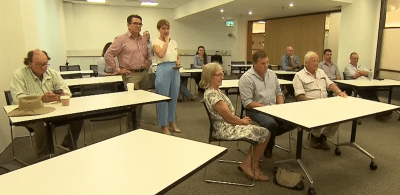Situations of high pressure and extreme duress can test the character of even the most seasoned and experienced leaders.
Luke Bowen was a young leader only a few years into the role of Northern Territory Cattlemen’s Association CEO when the northern cattle industry was thrust into the glare of the international media spotlight after ABC Four Corners broadcast footage of Australian cattle suffering cruel treatment in Indonesian abattoirs.
It was a ‘sink or swim moment’ but as history shows he rose confidently to the challenge.
Within weeks he quickly became recognised as an articulate and relatable spokesperson for the northern cattle industry, appearing daily on television screens around the country and helping to provide a calm and reasoned voice for the sector as a storm of public outrage erupted around it – one of the first public issues in Australia to be fuelled by the then-new phenomenon of social media.
Mr Bowen is today the General Manager of Northern Australia Development and Trade with the Northern Territory Government.

NT cattle industry stakeholders watch the livestream of Justice Rares’ verdict in Darwin last week. Image: Channel Nine
Last Tuesday he joined many of his former NTCA colleagues and members in Darwin to watch Federal Court Justice Stephen Rares hand down his live-streamed verdict on the class action launched against the Federal Labor Government’s 2011 export ban decision.
That the date of Justice Rares’ verdict on June 2 was exactly nine years to the day after Federal Agriculture Minister Joe Ludwig’s first control order on June 2, 2011, to ban exports to Indonesian abattoirs shown in the ABC Four Corners story was not lost on the former NT cattle industry leader.
It was Minister Ludwig’s subsequent decision five days later to extend the ban to the entire cattle export trade to Indonesia without exceptions for the closed loop supply already operating – the so-called “second control order” on January 7 – that was central to the industry’s class action challenge.
“When word came through that (Justice Rares’) judgment was to be handed down on June 2, my heart jumped,” Mr Bowen said.
“June 2 (2011) had been hot branded in my memory and so a sense of optimism burst into my expectations for a favourable judgement. Surely you would pick another day if the judgement was to be a negative one?”
And so it was. “Misfeasance” was the finding.
 Mr Bowen recalls that in the months immediately following the 2011 ban, in his role as NTCA CEO he found himself dealing with waves of lawyers, bush lawyers, law firms and “a few crackpots” who all put forward theories on how the industry could mount a legal challenge against the destructive Government decision.
Mr Bowen recalls that in the months immediately following the 2011 ban, in his role as NTCA CEO he found himself dealing with waves of lawyers, bush lawyers, law firms and “a few crackpots” who all put forward theories on how the industry could mount a legal challenge against the destructive Government decision.
In desperation he called his oldest brother, who owns a law firm in WA, for advice.
“He said ‘they are ambulance chasers’ – a term I had not heard before – and he gave me some advice on how to draft all but one or two into the bush paddock,” he recalls.
“It was in August 2011 that I first heard the word misfeasance, and it was a Canberra-based law firm (Minter Ellison) and their argument that carried the case, firstly as a group action seeking compensation out of court in September 2011 and then as a class action led by the Brett cattle Company and lodged in the federal court in 2014.”
Mr Bowen said it was “very surreal” to be sitting listening to the judgement by video last week on June 2, 2020.
He said the cattle industry found itself in a very different place nine years ago as social media and online tools were used by animal rights activists to drive panic within the Federal Government, resulting in – as Justice Rares last week determined – an unlawful decision to shut the entire trade to Indonesia.
“I remember well that by 10:30 the morning after Four Corners, I had 94 voice messages on my phone,” he said.
He quickly installed ‘voice to text’ to try to handle all the messages pouring in.
“It went like this for months,” he recalled.
“While the perception of an industry caught flat footed was peddled widely, the reality was an industry that for years had driven significant welfare improvements in developing countries, including Indonesia.
“Expectation of the appropriate pace of these improvements became the issue.
“At the time there was considerable debate about the authenticity of the footage in the Four Corners story and particularly that supplied by Animals Australia which had contracted a UK company Tracks Investigations.
“It just did not look right. At the time addressing what we knew to be the real issues was the priority.
“The government ban on the trade, only days after the ABC program, quickly moved from one of animal welfare to human welfare with the government becoming the target for a decision that just didn’t pass the pub test.
“It is interesting that today. Nine years on it still does not meet the pub test and a Federal Court judge agreed, going further to say it was illegal.
“The good news is that today, Australia is leading world standards for the export of live animals with the Exporter Supply Chain Assurance identifying and isolating poor practice on a road of continual improvement.
“Let’s hope the welfare of our people in the cattle industry is now to be addressed and not drawn out with an appeal.”
Govt considering appeal while compensating affected businesses
Attorney general Christian Porter has reportedly told Coalition colleagues he is concerned about the wider impact of the federal court ruling that Labor’s suspension of live cattle exports in 2011 was invalid because of the ramifications that finding could have for future Ministerial decisions.Media reports suggest it is possible the government will seek to compensate the affected graziers while still launching an appeal against aspects of the court decision.
Reports today said Mr Porter told a joint party room meeting yesterday that it was possible to do justice to those affected by the live-export shutdown decision while ensuring there was no impact on democratic decision-making by duly elected ministers.
Agriculture minister David Littleproud has said the Government will seek to make a decision on an appeal “as quickly and as fairly as we can”.

